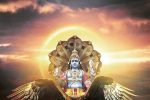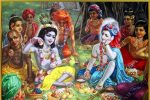NAME 64
Īśānaḥ ईशानः
Īśāna means the One, who controls everything in the universe. He is the Supreme Commander and under whose command everything acts. Fearing the Brahman, the sun shines, the wind blows, etc says Upaniṣads. Brahman is an able administrator.
Bṛhadāraṇyaka Upaniṣad (IV.iv.22) says, “He is the controller of all, the lord of all, the ruler of all”.
So He is the Supreme Controller
‘Ishaanah’ means ‘the controller’ or ‘the ordainer’. Sri Adi Sankara says ‘Sarva bhoota niyantrutvaat Ishaanah – He controls all beings and non-beings, hence he is called the Controller’. By this Nama, Bhagavan is clearly distinguished from the bound souls, released souls, and ever-free souls. This Nama signifies that it is His innate nature to keep all things under control under all circumstances. The Nama is derived from the root ‘Is’ – to command, to control, to rule, to possess. Ishaanam is also mentioned in the Venkatesa Prapatthi’s first verse (“Ishaanam Jagatosya Venkatapate…”).
It is interesting to note that Ishaanah is more commonly associated with Lord Shiva in particular to one of His 5 faces (along with Vaamadeva, Aghora, Tatpurusha and Sadyojaata). There is also a famous Vedic hymn Viz. – ‘Eeshaanas sarva vidyaanaam Eeshvaras Sarva bhootaanaam bramhaadhipatir bramhanodhipatir Bramhaa Shivo me Astu Sadaa Shivom’.
६४. ॐ ईशानाय नमः |
64. OM Īśānāya Namaḥ
Eesaanah –“The Controller of all the five Great Elements”. When this term is used, Eesvara becomes the Administrator of His own Law in the phenomenal world of plurality. The executive function of His Infinite Will, when manifested through Him, the Lord. Eesvara, is said to function as Eesaanah. Or, the term can also mean One who is the Supreme Eesvara-the Paramesvara.
Īṣṭe – sarvabhūtāni – svasvavyāpāreṣu niyamayati He who controls and regulates everything. Or by the reason of His controlling all things, He is called Īśānaḥ. ‘Īś’ implies ‘to control’.
Sarveṃdriyaguṇābhāsagˈṃ sarveṃdriya vivarjitam,
Sarvasya prabhum īśānaṃ sarvasya śaraṇaṃ suhr̥t. (17)
Śvetāśvataropaniṣat – Chapter 3
He is shining through the functions of all the senses, yet without the senses, Lord of everything, the controller and is the most reliable refuge for all.
INTERPRETATION GUIDED BY SANT VANI (WORDS OF SAINTS)
Īśānaḥ
The ruler of all beings.
He is Īśānah, because He is the ruler of all the beings. Īśvara is the one who has the lordship.
He who controls and regulates everything. He whose innate nature is to control and regulate everything…
While this name is interpreted by both Śaṅkara and Parāsara Battar to mean that the Supreme being is the great controller of the entire Universe including the five fundamental elements the Pancha-bhootas, it is imprtant to note that this interpretation has already been provided for an earlier name of Viṣṇu, namely BHŪTABHṚT.
While the standard interpretation provided by the popular commentaries is perfectly correct, it has been the practice in this series to also see if the names can be interpreted contextually and if there are subtle nuances that can be brought out that while not straying too far from the original, still make contextual and accurate sense – This comes from the fundamental premise that the Sashasranama beads are not words simply strung together but carefully curated, selected and strung together to make meaning individually, jointly and also collectively.
Therefore this name Īśānaḥ refers to the “subtle-inner-controller” who guides and directs the devotee who has turned his mind inwards. It is when we hand over the reins of our life to that indwelling charioteer that we discover the ‘Arjuna‘ within and “Kṛṣṇa” the embodiment of the Supreme being becomes the charioteer of our lives – this is the meaning of the “indwelling controller” and what it means to truly live in his consciousness – all work is an offering to him.
When such a Śharaṇāgati comes naturally then progress on the path gathers pace – because we have come into the ‘Sharan’ i.e benevolent protection of the Supreme being who is the Īśānaḥ.
“Surrender does not require that you close your eyes, that you turn a deaf ear or that you do not question, instead, it means looking at the world through His eyes, that you pay attention to your inner voice and that you exercise patience in understanding His answer. In fact, true surrender withstands any test, any examination.” – Om Swami
https://os.me/faith-meaning-surrender-to-divine-will/
You may want to read this story of faith from the great epic Mahabharata. A story of faith and surrender, of destiny and divinity.
https://os.me/a-story-of-faith/
“To work on everything that you can and to let go off everything beyond your control is faith in a nutshell. Such faith, made up of action and surrender, is the most potent antidote of all fears.
“Faith is heart’s wisdom. It’s what your mind can’t grasp but your heart knows. Give it a place in your life and you’ll fly with a thousand wings. Higher and swifter. Across the seas, beyond the skies.” – Om Swami
In the 7th Chapter; Verse-30 of the Bhagavad-gītā, Bhagawan declares that those who see him as the governing principle in all things, not only lead their life in full consciousness of the Supreme being but even in death they remain in full consciousness of the Supreme being:
साधिभूताधिदैवं मां साधियज्ञं च ये विदु: |
प्रयाणकालेऽपि च मां ते विदुर्युक्तचेतस: || 7-30||
sādhibhūtādhidaivaṁ māṁ sādhiyajñaṁ cha ye viduḥ
prayāṇa-kāle ’pi cha māṁ te vidur yukta-chetasaḥ
Those who see me as the governing principle in the entire field of matter (sādhibhūtā) and locate me as the supreme being in all the gods (ādhidaivaṁ), and as that person who is the receiver of the offerings in the Yajna and the Yajna (ādhiyajñaṁ) those are the people who remain in full the consciousness of my being both in life and death.
Every being is under His niyati, law. The word ‘ruler’ may bring up the notion of God being a dictator imposing his rules on poor, helpless subjects. Those who live in fear in most situations, and not courage, choose to conceptualise God as a dictator. That’s not what is meant here. These rules or laws are principles governing the different spheres of the jagat. Free will of the individual is also a part of the laws of Īśvara.



